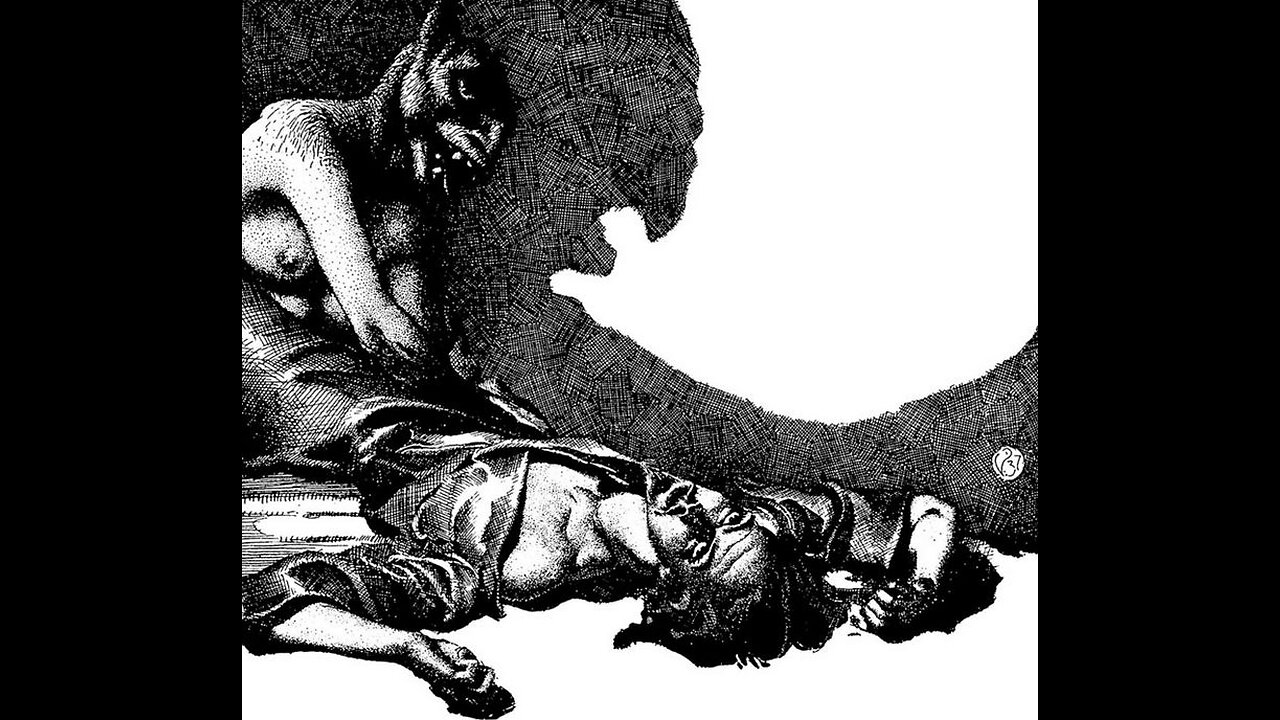Premium Only Content

"The Death of Ilalotha" by Clark Ashton Smith
Black Lord of bale and fear, master of all confusion!
By thee, thy prophet saith,
New power is given to wizards after death,
And witches in corruption draw forbidden breath
And weave such wild enchantment and illusion
As none but lamiae may use;
And through thy grace the charneled corpses lose
Their horror, and nefandous loves are lighted
In noisome vaults long nighted;
And vampires make their sacrifice to thee —
Disgorging blood as if great urns had poured
Their bright vermilion hoard
About the washed and weltering sarcophagi.
-Ludar's Litany to Thasaidon.
----
Xantlicha... I couldn't decide how to pronounce the 'licha', it's that 'ch' you see, there are several options, so you may hear several variations on it during the recording. What a strange name...
obsequies: funeral rites
scullion: a servant assigned the most menial kitchen tasks
amphora: a tall ancient Greek or Roman jar with two handles and a narrow neck
catafalque: a decorated wooden framework supporting the coffin of a distinguished person during a funeral or while lying in state
parterre: n ornamental garden with paths between the beds
suspiration: a long deep breath; a sigh
bawcock: a fine fellow
sexton: an officer of a church, congregation, or synagogue charged with the maintenance of its buildings and/or an associated graveyard
cortège: a solemn procession, especially for a funeral
assignation: an appointment to meet someone in secret, typically one made by lovers
exigence: an urgent need or demand
mummia: any of several different preparations in the history of medicine, from "mineral pitch" to "powdered human mummies". In our case here, it almost certainly refers a type of resinous bitumen found in Western Asi, used as an aphrodisiac.
cantraip: a magic spell (known these days, at least in D&D, with the spelling of 'cantrip')
cothurn: a high thick-soled laced boot worn by actors in Greek and Roman tragic drama
poulaine: A long, pointed toe of a shoe, a style fashionable in the 14th and 15th centuries. From the Middle French "soulers a la poulaine" ("shoes in the Polish fashion").
The picture used is an illustration by Virgil Finlay for the story as published in Weird Tales
To follow along: http://www.eldritchdark.com/writings/short-stories/38/the-death-of-ilalotha
-
 6:53
6:53
Rena Malik, M.D.
22 hours agoWhy Antidepressants Wreak Havoc on Your Sex Life?! | Urologist Explains How to Boost your Libido
852 -
 1:00:00
1:00:00
BEK TV
2 days agoMIKE MOTSCHENBACHER ON NORTH DAKOTA POLITICS, TEA PARTY ROOTS, AND THE 2026 ELECTION
2.7K -
 15:31
15:31
Breaking Points
1 day agoIs Trump Planning VENEZUELA Regime Change?
19.4K15 -
 2:06:05
2:06:05
"What Is Money?" Show
2 days agoTrump Family Bitcoin Bet Will Trigger Nation-State FOMO w/ Matt Prusak (CEO American Bitcoin)
5.94K -
 1:04:36
1:04:36
Dialogue works
3 days ago $2.44 earnedMohammad Marandi: Iran Just Gave Israel a FINAL Warning…
10.6K6 -
 9:20
9:20
daniellesmithab
1 day ago3 Bad Laws
15.1K7 -
 9:22
9:22
MattMorseTV
17 hours ago $10.46 earnedINDIA just made a BIG MISTAKE.
58.3K54 -
 12:11
12:11
Nikko Ortiz
16 hours agoCrashout 6 Rumble
12.6K3 -
 22:35
22:35
GritsGG
16 hours agoThe KILO is BACK! The Best AR on Warzone FRIES!
21K1 -
 2:16:36
2:16:36
Side Scrollers Podcast
19 hours agoStreamer KICKED OUT of Renaissance Fair for Misgendering + Spiderman MELTDOWN | Side Scrollers Live
43.8K8